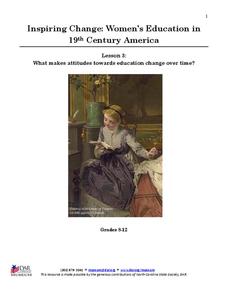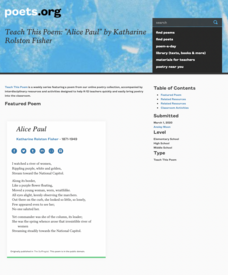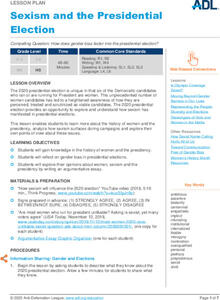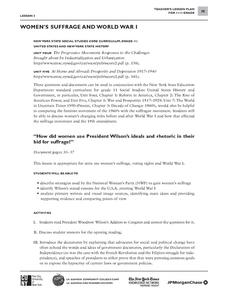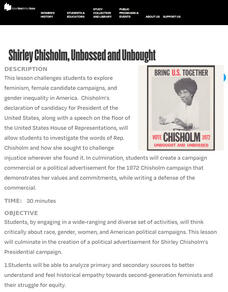National Society Daughters of the American Revolution
Lesson 3: What Makes Attitudes Towards Education Change over Time?
The struggle for women's rights is not unique to this generation, or even to the 20th century. Class members explore the conflicting opinions of Alexander Graham Bell and his wife, Mabel Hubbard Bell, regarding women's pursuits of higher...
National Woman's History Museum
Tea with Penelope: A 2-Point Perspective of the Edenton Tea Party
A brief introduction to Penelope Barker sets the stage for a discussion about political cartoons and the persuasive technique used to create them. A graphic organizer aids scholars in the analysis of a piece of work using a 2-point...
National Woman's History Museum
Dolores Huerta: The Life and Work of a 20th Century Activist
Extra! Extra! High schoolers read about Dolores Huerta, the social activist who helped organize the United Farm Workers. Researchers read primary and secondary sources about Huerta's work and craft a headline, supported by three pieces...
PBS
Gloria Steinem’s Ancestry and Women’s Rights Movements: Lesson Plan | Finding Your Roots
Introduce class members to Presidential Medal of Freedom winner, activist, writer, and lecturer Gloria Steinem with a PBS resource that not only investigates Steinem's ancestry but also encourages learners to trace their own.
PBS
Women's History: Clara Barton
Students investigate Clara Barton's contributions to society. In this Clara Barton lesson plan, students watch videos, listen to lectures, and conduct research regarding Clara Barton's life and her possible authorship of a Civil War...
National Woman's History Museum
19th Amendment
As part of a study of the women's suffrage movement and the ratification of the Nineteenth Amendment, young historians examine documents that detail when voting rights were granted to women in various countries and when US states...
National Woman's History Museum
From the Declaration of Independence to the Declaration of Sentiments
As part of a study of women's rights in early America, class members compare the Declaration of Independence to the Declaration of Sentiments presented at the Seneca Falls Convention. As an exit ticket, individuals explain whether or not...
Academy of American Poets
Teach This Poem: "Alice Paul" by Katharine Rolston Fisher
Powerful women need not look like Wonder Woman. After writing a paragraph about a strong woman they know, young scholars examine images of Alice Paul and then do a close reading of Katharine Rolston Fisher's poem "Alice Paul." Finally,...
Curated OER
International Women's Day 100th Anniversary Nobel Laureate Wangari Maathai: Shaking the Tree
Students explore the significance of International Women's Day. In this women's history lesson, students read excerpt of Wangari Maathai's acceptance speech for the Nobel Peace Prize and analyze the lyrics of "Shaking the Tree," by Peter...
Curated OER
Pizza Biography
A biography writing lesson plan with a tasty twist! Kids create a "visual biography" in which each pizza slice represents a paragraph, and toppings represent supporting details. They learn research techniques, note-taking skills, and how...
Roy Rosenzweig Center for History and New Media
Early English Settlements History Detectives
Young historians play the role of history detectives as they investigate some primary source texts and images related to the early colonization of America, The Jamestown Settlement, and the Mayflower Compact.
American Institute of Physics
When Computers Wore Skirts: Katherine Johnson, Christine Darden, and the “West Computers”
Did you know that people, known as computers, performed the complex calculations that are now done by electronic computers? Three of these human computers, Katherine Johnson, Christine Darden, and Melba Roy Mouton are featured in a...
NPR
Young And Brave Lesson Plan
Honor brave young women with a lesson that showcases 30 individuals who's achievements made a lasting impression on our country's history. Here, scholars randomly choose a person to examine from an interactive myseum exhibit then share...
NPR
Journalism Lesson Plan
Honor women in journalism with an online exhibit called Women with a Deadline. Class members demonstrate their understanding of the topic in a final assessment by writing a newspaper article on the information they learned in the online...
Curated OER
Exploring Women's History
Students read and analyze Jessie Benton Fremont's travelogue of her trip out west in 1849 to identify the gender roles, social attitudes and class distinctions of the time. They then adapt the the travelogue into a film script.
Anti-Defamation League
Sexism and the Presidential Election
Young historians investigate how sexism impacted the 2020 United States presidential election. They examine media coverage of the six women candidates, engage in a four-corners debate reacting to statements about gender and the...
City University of New York
Woman's Suffrage and World War I
How did women use President Wilson's ideals and rhetoric in their bid for suffrage? To answer this essential question, class groups analyze primary written documents and visual images.
Daughters of the American Revolution
Lesson 2: How Do We Determine the Value of Education?
Have women always had the same educational opportunities as their male counterparts? Young historians read an 1819 essay by Emma Willard on the state of female education in the 19th century before discussing their views regarding women's...
Elizabeth Murray Project
Gender and Opportunity in Colonial America
What was life like for women in Colonial America? What restrictions were placed upon them and what opportunities were they afforded? A case study of Elizabeth Murray offers high schoolers a chance to investigate primary source documents...
Daughters of the American Revolution
Lesson 1: How Do Society’s Expectations Influence Education?
The history of women's education can be traced back to the delicate stitching of student samplers from the 19th century. Modern-day pupils examine and analyze four primary sources, three of which are images of embroidered samplers, which...
National Woman's History Museum
Shirley Chisholm, Unbossed and Unbought
An engaging resource introduces young historians to Shirley Chisholm, the woman, the Black congresswoman, the activist, and the candidate for President in 1972. Class members study primary sources, watch a video of her announcing her run...
US House of Representatives
Objects in Time
What is the role artifacts play in the study of past events and people? As part of an examination of the careers and contributions of women in Congress from 1917 to 2006, groups examine artifacts that symbolize each woman.
National Woman's History Museum
The National Woman’s Party
Two parties led the women's suffrage movement. The National American Woman Suffrage Association (NAWSA) was a moderate organization while the National Women's Party (NWP) was more militant. Young historians investigate why members of the...
National Woman's History Museum
Seneca Falls Convention
The 1848 Seneca Falls Convention was a historic milestone in the quest for women's rights. After researching one of the participants of the Seneca Falls Convention, young historians craft and share a short presentation about their subject.
Other popular searches
- March Women's History Month
- Women's History Month Art
- March: Women's History Month
- March Womens History Month


